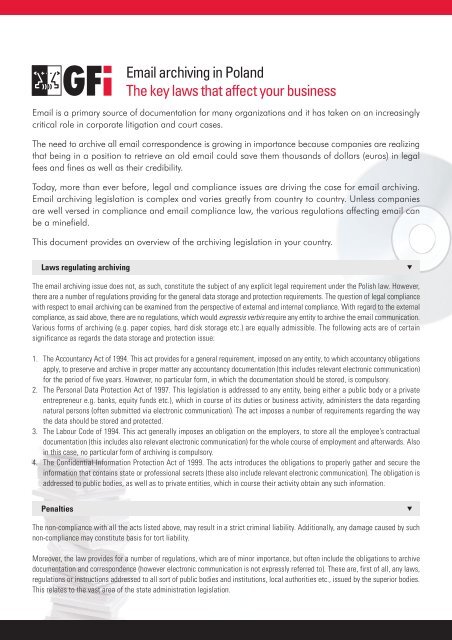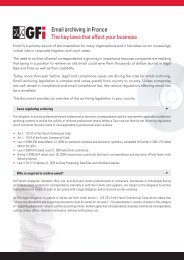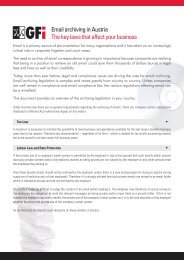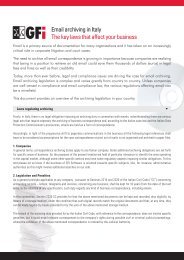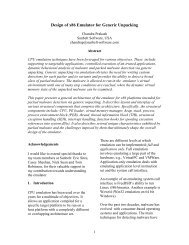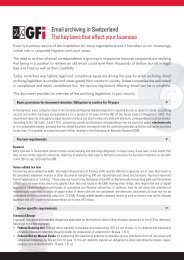Email archiving in Poland The key laws that affect your ... - GFI.com
Email archiving in Poland The key laws that affect your ... - GFI.com
Email archiving in Poland The key laws that affect your ... - GFI.com
Create successful ePaper yourself
Turn your PDF publications into a flip-book with our unique Google optimized e-Paper software.
<strong>Email</strong> <strong>archiv<strong>in</strong>g</strong> <strong>in</strong> <strong>Poland</strong><br />
<strong>The</strong> <strong>key</strong> <strong>laws</strong> <strong>that</strong> <strong>affect</strong> <strong>your</strong> bus<strong>in</strong>ess<br />
<strong>Email</strong> is a primary source of documentation for many organizations and it has taken on an <strong>in</strong>creas<strong>in</strong>gly<br />
critical role <strong>in</strong> corporate litigation and court cases.<br />
<strong>The</strong> need to archive all email correspondence is grow<strong>in</strong>g <strong>in</strong> importance because <strong>com</strong>panies are realiz<strong>in</strong>g<br />
<strong>that</strong> be<strong>in</strong>g <strong>in</strong> a position to retrieve an old email could save them thousands of dollars (euros) <strong>in</strong> legal<br />
fees and f<strong>in</strong>es as well as their credibility.<br />
Today, more than ever before, legal and <strong>com</strong>pliance issues are driv<strong>in</strong>g the case for email <strong>archiv<strong>in</strong>g</strong>.<br />
<strong>Email</strong> <strong>archiv<strong>in</strong>g</strong> legislation is <strong>com</strong>plex and varies greatly from country to country. Unless <strong>com</strong>panies<br />
are well versed <strong>in</strong> <strong>com</strong>pliance and email <strong>com</strong>pliance law, the various regulations <strong>affect</strong><strong>in</strong>g email can<br />
be a m<strong>in</strong>efield.<br />
This document provides an overview of the <strong>archiv<strong>in</strong>g</strong> legislation <strong>in</strong> <strong>your</strong> country.<br />
Laws regulat<strong>in</strong>g <strong>archiv<strong>in</strong>g</strong><br />
<strong>The</strong> email <strong>archiv<strong>in</strong>g</strong> issue does not, as such, constitute the subject of any explicit legal requirement under the Polish law. However,<br />
there are a number of regulations provid<strong>in</strong>g for the general data storage and protection requirements. <strong>The</strong> question of legal <strong>com</strong>pliance<br />
with respect to email <strong>archiv<strong>in</strong>g</strong> can be exam<strong>in</strong>ed from the perspective of external and <strong>in</strong>ternal <strong>com</strong>pliance. With regard to the external<br />
<strong>com</strong>pliance, as said above, there are no regulations, which would expressis verbis require any entity to archive the email <strong>com</strong>munication.<br />
Various forms of <strong>archiv<strong>in</strong>g</strong> (e.g. paper copies, hard disk storage etc.) are equally admissible. <strong>The</strong> follow<strong>in</strong>g acts are of certa<strong>in</strong><br />
significance as regards the data storage and protection issue:<br />
1. <strong>The</strong> Accountancy Act of 1994. This act provides for a general requirement, imposed on any entity, to which accountancy obligations<br />
apply, to preserve and archive <strong>in</strong> proper matter any accountancy documentation (this <strong>in</strong>cludes relevant electronic <strong>com</strong>munication)<br />
for the period of five years. However, no particular form, <strong>in</strong> which the documentation should be stored, is <strong>com</strong>pulsory.<br />
2. <strong>The</strong> Personal Data Protection Act of 1997. This legislation is addressed to any entity, be<strong>in</strong>g either a public body or a private<br />
entrepreneur e.g. banks, equity funds etc.), which <strong>in</strong> course of its duties or bus<strong>in</strong>ess activity, adm<strong>in</strong>isters the data regard<strong>in</strong>g<br />
natural persons (often submitted via electronic <strong>com</strong>munication). <strong>The</strong> act imposes a number of requirements regard<strong>in</strong>g the way<br />
the data should be stored and protected.<br />
3. <strong>The</strong> Labour Code of 1994. This act generally imposes an obligation on the employers, to store all the employee’s contractual<br />
documentation (this <strong>in</strong>cludes also relevant electronic <strong>com</strong>munication) for the whole course of employment and afterwards. Also<br />
<strong>in</strong> this case, no particular form of <strong>archiv<strong>in</strong>g</strong> is <strong>com</strong>pulsory.<br />
4. <strong>The</strong> Confidential Information Protection Act of 1999. <strong>The</strong> acts <strong>in</strong>troduces the obligations to properly gather and secure the<br />
<strong>in</strong>formation <strong>that</strong> conta<strong>in</strong>s state or professional secrets (these also <strong>in</strong>clude relevant electronic <strong>com</strong>munication). <strong>The</strong> obligation is<br />
addressed to public bodies, as well as to private entities, which <strong>in</strong> course their activity obta<strong>in</strong> any such <strong>in</strong>formation.<br />
Penalties<br />
<strong>The</strong> non-<strong>com</strong>pliance with all the acts listed above, may result <strong>in</strong> a strict crim<strong>in</strong>al liability. Additionally, any damage caused by such<br />
non-<strong>com</strong>pliance may constitute basis for tort liability.<br />
Moreover, the law provides for a number of regulations, which are of m<strong>in</strong>or importance, but often <strong>in</strong>clude the obligations to archive<br />
documentation and correspondence (however electronic <strong>com</strong>munication is not expressly referred to). <strong>The</strong>se are, first of all, any <strong>laws</strong>,<br />
regulations or <strong>in</strong>structions addressed to all sort of public bodies and <strong>in</strong>stitutions, local authorities etc., issued by the superior bodies.<br />
This relates to the vast area of the state adm<strong>in</strong>istration legislation.
In many cases, when the law does not provide for a b<strong>in</strong>d<strong>in</strong>g requirement of data <strong>archiv<strong>in</strong>g</strong>, it provides for a certa<strong>in</strong> benefits for the<br />
entities, which actually archive and store their documentation and/or correspondence. One significant aspect of the above, appears <strong>in</strong><br />
course of private law court arguments, when it <strong>com</strong>es to evidence exam<strong>in</strong>ation, where the evidence of contractual document is generally<br />
always predom<strong>in</strong>ates. <strong>The</strong> pre-contractual documentation and/or correspondence may also prove significant, especially when it <strong>com</strong>es<br />
to cases of culpa <strong>in</strong> contrahendo, evidenc<strong>in</strong>g the course of negotiations etc.<br />
Who is required to archive email<br />
S<strong>in</strong>ce the Polish law does not strictly and explicitly demand the <strong>archiv<strong>in</strong>g</strong> of electronic <strong>com</strong>munication, the issues of an <strong>in</strong>ternal <strong>com</strong>pliance<br />
be<strong>com</strong>e important. Many entrepreneurs, and not only the large corporations, but also small and medium bus<strong>in</strong>esses, adopt <strong>in</strong>ternal<br />
regulations, provid<strong>in</strong>g <strong>in</strong>ter alia for email <strong>com</strong>munication <strong>archiv<strong>in</strong>g</strong>. As mentioned above, by do<strong>in</strong>g so, they put themselves <strong>in</strong> a better<br />
position, when it <strong>com</strong>es to a legal dispute. An <strong>archiv<strong>in</strong>g</strong> obligation is also <strong>com</strong>monly adopted by many public <strong>in</strong>stitutions and local<br />
authorities, by way of <strong>in</strong>ternal regulations and by<strong>laws</strong>. Even when the superior body does not requests so, such obligations are often<br />
adopted by means of self-organisation.<br />
<strong>GFI</strong> MailArchiver<br />
<strong>GFI</strong> MailArchiver is used by thousands of adm<strong>in</strong>istrators to <strong>com</strong>ply with the various pieces of legislation <strong>that</strong> cover email <strong>archiv<strong>in</strong>g</strong>.<br />
<strong>GFI</strong> MailArchiver provides a secure central storage for all <strong>com</strong>pany email while allow<strong>in</strong>g fast and easy access to old and deleted<br />
email if required.<br />
Us<strong>in</strong>g the audit<strong>in</strong>g functionality, management can access any email <strong>that</strong> is requested for eDiscovery/email <strong>com</strong>pliance purposes and<br />
provide a guarantee <strong>that</strong> these emails have not been tampered with – a major requirement <strong>in</strong> corporate litigation cases.<br />
With <strong>GFI</strong> MailArchiver, <strong>com</strong>panies can also rest assured <strong>that</strong> they can:<br />
• Reduce reliance on cumbersome PST files and manage and reduce mailbox quotas on Microsoft Exchange server<br />
• Access and manage all archived email from anywhere <strong>in</strong> the world us<strong>in</strong>g their web browser<br />
• Retrieve old and deleted emails on demand – with full thread and conversation<br />
• Use advanced email search and ‘Saved Search’ capabilities<br />
More <strong>in</strong>formation about <strong>GFI</strong> MailArchiver can be found at http://www.gfi.<strong>com</strong>/mailarchiver/.


